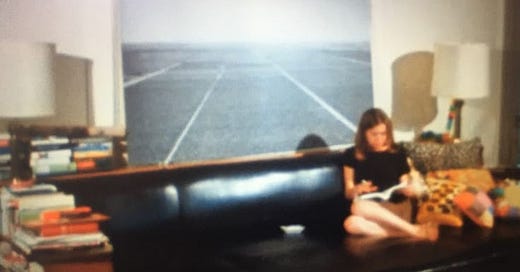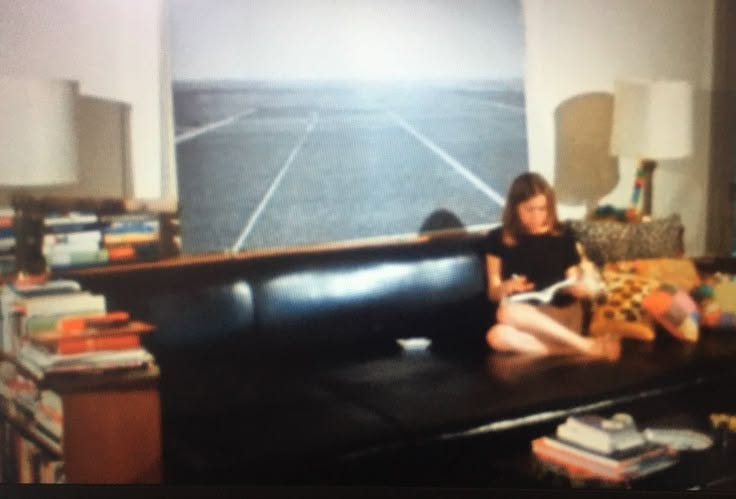
“Louis, I think this is going to be the beginning of a beautiful friendship.” So goes the final line of Casablanca.
“Best last line of a movie ever,” Harry, played by Billy Crystal, murmurs over the phone to Meg Ryan’s Sally, in my favourite movie.
In Didion & Babitz, Lili Anolik tells the story of a complicated friendship between Joan Didion and Eve Babitz. She’s clearly biased towards Eve, fiercely protecting her while pointing the finger at Joan, something that she doesn’t acknowledge until the final few chapters.
I adore Eve. Reading Babitz at the bar with a big glass of red makes me happy. The stories she writes: tales of Hollywood and married men, Godfather sets and rockstar sex.
As much as I love Eve (Slow Days, Fast Company is my favourite book), Joan opened up the world to me. She showed me how good writing can be, her voice and style melting into my mind at a formative age. She took me through 60s New York and LA, she introduced me to LSD and California, Joan Baez and Jim Morrison. I remember reading her essays in my childhood bedroom, going over Slouching Towards Bethlehem’s sentences over and over, trying to understand the mystery of its magic.
Anolik posits Eve and Joan as counterparts — hot and cold, brave and cowardly, active and passive. I think of them as two types of people at a party.
There’s Babitz, loud and mouthy and flirty and fizzy, all druggy electricity and charged energy. Living honestly, purely for the moment (not “for the plot”). She’s the last to leave the party.
Then there’s Didion: cold, calculated, discerning. A wallflower with a weapon, her pen is her sword. At the party, she says very little, observing everyone and remembering everything.
Here, I think about something that Phoebe Waller-Bridge once said: “We write to live life twice.”
To me, Didion and Babitz differ when it comes to their motivation to write. Didion wrote because she was Good, and she used her life as material to be Great — her best work is arguably her most personal. Babitz lived her life to the fullest, and she had stories to tell because of it. She wrote because she wanted to contribute, to turn her creative, frenetic energy into something fantastic. Sometimes, she struck gold, drawing you into her world, a version of LA that sparkled with cokey, dreamy possibility and raucous allure.
I relate to Didion’s relationship to writing, and to Babitz’s attraction to the sex of life. I go to parties, then I come home and write about something that happened to me six months ago. As I texted a friend:
Reading Didion & Babitz, I thought about the stories that Joan and Eve told themselves. Eve told herself that she was free — free to drive too fast and crash the car, because her sister or mother would come to rescue her (she lived with them both well into adulthood). Joan told herself that she was small — small enough to be a fly on the wall, to observe the stories that she’d later sell. Smaller, still, when it came to her husband — who, when drunk, got mean, while Joan quietly retreated. Anolik describes a scene at a restaurant: Joan’s husband had just gone to the restroom, and as the friend they were dining with rose to leave, Joan grabbed her arm, pleading: “Please don’t leave me alone with him.”
Stories like these are the hidden gems in Didion & Babitz, with Anolik shining light on what happened behind closed doors, Joan’s in particular.
When Joan described how she cried in laundromats the summer that she left New York in Goodbye, to All That, I knew that there was something she wasn’t saying. Anolik explains that, when she wrote the essay, the love of her life had once again broken her heart. He wasn’t her husband, but a friend of his, who set her and John up after their own failed relationship. He was a playboy, a serial cheater, and he knew that they could never work long term (she always wanted to get married and have children). She wrote about him in almost everything she published. She never used his name, but he was there; in his mannerisms, his physicality, his magnetic charm. When Anolik asked him about this in an interview for the book, he sighed and said “That was just Joan.” In retrospect, her consuming crying jags all over New York make perfect sense.
Another truth that Didion never shared — her daughter, Quintana, died of complications related to alcoholism, something that she doesn’t address in the memoir, Blue Nights, which is all about Quintana’s death. I wonder if Didion was telling herself a story in order to live, or if she was protecting her daughter’s image, or both.
In contrast, Babitz bares it all (everything that she is aware of, at least) and her honesty is what makes her work so engrossing. Didion shields her most relatable and compelling truths away, hiding behind exacting sentences and big sunglasses, and these are the stories I wish she’d told. But I understand why she didn’t, because I feel like I understand who she was, and how she thought she had to save face.
In When Harry Met Sally, Harry tells Sally that he reads the last page of every book he buys, just in case he dies before he makes it to the end. He remarks that this preparedness means that when the ship goes down, he’ll be ready for it.
“In the meantime you’re going to ruin your whole life waiting for it,” Sally says, her eyes wide with horror.
Eve never thought about the ship going down, she kept the end out of sight and partied until she lost her mind. Joan was aware of the little deaths that happen every day, and she wrote about them from a distance. When the ship went down and her husband died, she wrote The Year of Magical Thinking, and her star power shot up yet again, later in life.
Like Eve, I’ve buried my head in the sand in pursuit of pleasure, partying until the crash comes. Like Joan, I’ve proceeded to write my way around the wreck, publishing stories of love and loss because I know that the writing is Good. And when I used to cry in laundromats, it was about playboys, not the blue nights.







This is brilliantttt
gulped it down. long live the party girl in all her forms